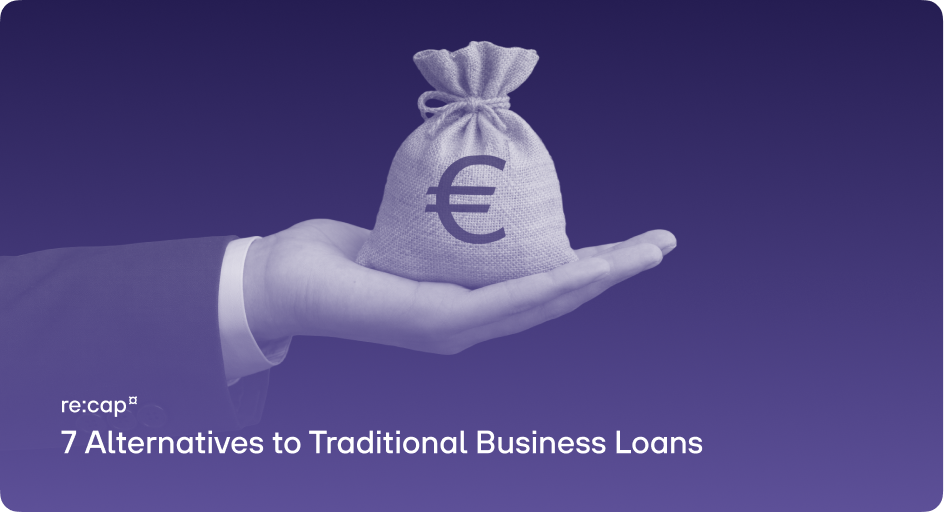Companies need sufficient capital and liquidity for founding a company and running operations. There are various financing options available for this purpose – both internal and external.
Especially for startups and growing companies, sufficient capital is crucial. Due to their lack of history and revenue, they can't access large equity reserves. Usually, they rely on external money.
When considering funding, early-stage companies focus on equity and less on debt. However, traditional loans from banks are difficult for startups to obtain. While bootstrapping is an option, many startups turn to investors to obtain either equity or debt.
The situation is different for established companies. For them, business financing without equity is often a conscious decision. They want to save equity, diversify their capital structure, and finance investments with external investors.
TL;DR
- Corporate financing without equity is offering companies access to capital without diluting ownership.
- Alternative instruments like factoring, leasing, venture debt, and government loans are tailored to different business models and growth stages.
- These options help businesses stay liquid and in control, making them ideal for startups and scale-ups with limited equity reserves.
Interested in your funding scenario?
Get access to re:cap and calculate your funding terms or talk to one of our experts to find out how we can help you with our tailored debt funding.
Get your funding termsCorporate financing without equity gains importance
Corporate financing without equity is becoming increasingly popular. This is primarily due to the new funding instruments available to companies. Alternative financing enables them to access capital outside the usual sources.
Those instruments adapt to different business models and company phases. They are ideally suited for companies without large equity reserves and looking for a non-dilutive funding instrument.
Instruments for corporate financing without equity
Whether a company needs debt or equity capital depends on the investment. Different alternative financing options are available for this purpose, for which they have to bring in little or no equity capital. Each has its advantages and disadvantages as well as its use cases.
The most common forms of corporate financing without equity include:
Factoring
With factoring, a company sells its receivables to a factoring provider or factor. The factor pays the company the invoice amount immediately minus a fee. The company does not have to wait weeks or months until cash is available.
The capital can be deployed immediately. This improves liquidity. Factoring is particularly suitable for companies with high revenues and long-payment terms.
Types of Factoring
- Full-service factoring or recourse factoring
- Non-recourse factoring
- Open factoring
- Silent factoring
- Due date factoring
- Section factoring
- In-house factoring
Leasing
Companies can lease assets such as machines, equipment, or vehicles instead of buying them. This allows them to free up capital while still gaining access to the needed resources.
Alternative Debt Financing
With alternative debt funding, companies receive financing tailored to their needs, based on their cash flow and business plan.
The financing amount and repayment terms can be flexibly designed and adapted to the company's development.
This gives companies tailor-made corporate financing without equity and does not dilute their shares. re:cap also offers this type of financing.
Convertible Loans
With a convertible loan, a company receives debt capital from investors who can convert their investment into equity (company shares) at a later date.
Convertible loans are particularly popular with startups because existing investors can invest without much effort. The conversion usually takes place at the next equity financing round.
Venture Debt
Venture debt provides credit-financed venture capital. It is designed for growth companies and it is used between two equity funding rounds.
Companies receive debt capital through a venture loan. However, venture debt lenders also secure themselves against credit risk with high-interest rates.
Venture Capital
Venture capital is one of the popular financing instruments for startups and growth companies. Early-stage companies receive equity from VC funds and, in return, give them shares in their company. While startups receive large sums of capital when financed with VCs, founders also give up control over their company.
Business Angels
Business angels are private investors who invest in young companies. They bring equity, know-how, and network to the table. Business angels are usually founders or entrepreneurs themselves and are available for advice.
Crowdfunding
Crowdfunding platforms enable companies to raise capital from a large number of supporters. In return for their investment, they usually receive a non-cash reward (e.g., the product built with the funding). In addition to classic crowdfunding, there is also equity-based crowdfunding and crowdlending.
Government Loans
Companies that want to borrow debt capital but do not have the necessary equity and collateral can receive promotional loans from government-backed banks or credit institutions.
These offer favorable conditions and repayment options. They are one way to realize corporate financing without equity.
Bootstrapping
In bootstrapping, the company generates its own equity. It means that a company finances itself solely through internal resources and revenue.
This often requires a high level of perseverance and discipline but results in the company operating entirely without external capital. Measures for effective bootstrapping can include cost reduction and a strong focus on cash flow.
Summary: Corporate financing without equity
Corporate financing without equity has gained importance in recent years. Closely associated with this is the emergence of alternative financings. For these, companies typically need to contribute less equity and collateral. It's especially relevant to startups and growth companies which don't have sufficient internal funds to finance themselves yet. Even companies with adequate equity opt for external financings. Typically, the cost of capital for equity is higher than for debt.
Q&A: Corporate financing without equity
What is corporate financing without equity?
Corporate financing without equity refers to raising capital without giving up ownership in your company. Instead of issuing new shares, businesses use instruments like debt financing, leasing, or factoring to secure funds. This approach allows companies to access capital while maintaining full control and avoiding dilution.
What are the most common types of non-equity financing?
Popular non-equity financing options include:
- Factoring: Selling receivables to access cash immediately
- Leasing: Acquiring equipment without upfront purchase costs
- Revenue-based financing: Repaying capital as a percentage of revenue
- Venture debt: Loans for growth-stage startups between funding rounds
- Government loans: Subsidized credit with favorable terms
Each option serves different use cases and company stages.
When should a company consider financing without equity?
Companies should consider non-equity financing when they want to:
- Avoid dilution of ownership
- Finance short-term liquidity needs
- Bridge gaps between equity rounds
- Fund growth without giving up control
- Maintain better cost-efficiency (debt is often cheaper than equity)
It’s especially useful for startups with recurring revenue or limited equity reserves.
Is non-equity financing suitable for early-stage startups?
Yes, especially if the startup has predictable cash flow or customer contracts. Tools like factoring, leasing, or revenue-based financing can be viable alternatives to traditional equity rounds. However, early-stage companies should ensure that repayment terms are aligned with their financial runway and growth trajectory.
What are the risks of non-equity financing?
While non-equity financing avoids dilution, it does come with risks:
- Repayment pressure: Debt must be repaid regardless of revenue
- Cost of capital: Interest or fees can add up
- Over-leverage: Relying too heavily on debt may affect creditworthiness
- Limited flexibility: Some instruments come with usage restrictions or covenants
Interested in your funding scenario?
Get access to re:cap and calculate your funding terms or talk to one of our experts to find out how we can help you with our tailored debt funding.
Get your funding terms

.gif)








